1993 年 1 月英语六级真题及答案
Part I Listening Comprehension (20 minutes)
Section A
1.
A) It was misleading.
B) It was enjoyable.
C) It was rather boring.
D) It was just so-so.
2.
A) Pop music.
B) Folk music.
C) Classical music.
D) All kinds of music.
3.
A) He will fly directly to his destination.
B) He has to change at Albany.
C) He is still not sure how to get there.
D) He must change at Jacksonville.
4.
A) It’s late.
B) It’s crowed.
C) It’s empty.
D) It’s on time.
5.
A) Unusual.
B) Enthusiastic.
C) Serious.
D) Threatening.
6.
A) Her name is on the top of the list.
B) She will be the last to be interviewed.
C) She is expecting a job interview.
D) She must fix a date for the job.
7.
A) The husband is not usually so observant.
B) The wife is annoyed at her husband’s complaint.
�
C) The husband hasn’t told the truth.
D) The wife is going to the hairdresser’s.
8.
A) The student miss their professor very much.
B) The professor didn’t give the lesson.
C) A new course will begin next Monday.
D) Some homework was assigned to the students.
9.
A) She accepted their request.
B) She rejected their request.
C) She agreed to consider their request.
D) She asked them to come with the other.
10. A) At work.
B) Back at home.
C) At the meeting.
D) Away from home.
Section B
Questions 11 to 13 are based on the passage you have just heard.
Passage One
11. A) Cheap clothes.
B) Expensive clothes.
C) Fashionable clothes.
D) Informal clothes.
12. A) They enjoy loud music.
B) They seldom lose their temper.
C) They want to have children.
D) They enjoy modern dances.
13. A) Her twin sister often brings friends home and this annoys the speaker.
B) They can’t agree on the color of the room.
C) They can’t agree on the kind of furniture.
D) The speaker likes to keep things neat while her twin sister doesn’t.
Passage Two
�
Questions 14 to 17 are based on the passage you have just heard.
14. A) In the first semester.
B) In the second semester.
C) In the third semester.
D) In the fourth semester.
15. A) She is ill.
B) She is too old.
C) Her husband wants her to.
D) Her husband is ill.
16. A) His father.
B) His mother.
C) His girl friend.
D) His teacher.
17. A) He has decided to continue his studies.
B) He has still to make a decision.
C) He has decided to give up his job.
D) He has still to take a part time job.
Questions 18 to 20 are based on the passage you have just heard.
Passage Three
18. A) Twenty years.
B) A couple of weeks.
C) A couple of years.
D) Five years.
19. A) David had been selling cars.
B) David had taught business.
C) David had become a salesman.
D) David had made a lot of money.
20. A) Rich people are not happy.
B) Being rich is the best thing in the world.
C) Being rich is not always a good thing.
�
D) Rich people are usually with their families.
Part II Reading Comprehension (35 minutes)
Questions 21 to 25 are based on the following passage.
Protests at the use of animals in research have taken a new and fearful character
in Britain with the attempted murder of two British scientists by the terrorist
technique of the pre-planted car-bomb.
The research community will rightly be alarmed at these developments, which have
two objectives: to arouse public attention and to frighten people working in research
with animals. The first need is that everything should be done to identify those
responsible for the crimes and to put them on trail. The Defence Research Society has
taken the practical step of offering a reward of 10,000 pounds for information leading
to those responsible, but past experience is not encouraging. People are unlikely to
be tempted by such offers. The professional police will similarly be confronted by the
usual problem of finding a needle in a haystack.
That is why the intellectual (知识分子) community in Britain and elsewhere must
act more vigorously in its own defence. There are several steps that can be taken, of
which the chief one is to demand of all the organizations that exist with the declared
objectives of safeguarding the interests of animals that they should declare clearly
where they stand on violence towards people. And it will not be enough for the chairmen
and chairwomen of these organizations to utter placatory(安抚的) statements on behalf
of all their members. These people should also undertake that it will be a test of
continuing membership in their organizations that members and would be members should
declare that they will take no part in acts of violence against human beings. Even such
undertakings would not be fully effective: people, after all, can lie. But at least
they would distinguish the organizations entitled to a continuing voice in the dialogue
with the research community about the rights of animals in research from the
organizations that deserve no say.
21. The words “these developments” (Para. 2, Line 1) most probably refer to ________.
A) the acts of violence against scientists
B) the use of animals in research
C) the techniques of planting bombs in cars
D) the establishment of new animal protection organization
22. Which of the following is TRUE according to the passage?
A) The police abandoned their efforts to find the criminals.
B) The terrorists escaped with the help of their organizations.
C) The attempted murder caused grave anxiety among British scientists.
D) People sympathized murder caused grave anxiety among British scientists.
�
23. The author’s purpose in writing his article is to demand that animal-protecting
organizations ________.
A) declare their objectives clearly
B) give up the use of violence
C) continue the dialogue with the scientific community
D) help to find those responsible for the attempted murder
24. In the author’s opinion ________.
A) since people can lie, the problem about their rights of scientists can’t be
solved
B) animal-protecting organizations about be held responsible for acts of violence
against scientists
C) animal protection organizations should be declared illegal
D) the scientists should take effective measures to protect themselves
25. What does the word “they” (Para. 3, Line 3) refer to?
A) The animal-protecting organizations.
B) The organizations that will talk with the research community.
C) Those who support the use of animals in research.
D) Those who support the animal-protection organizations.
Questions 26 to 30 are based on the following passage.
The earlier type of suburb, which was most dependent on the railroad, had a special
advantage that could be fully appreciated only after it had disappeared. These suburbs,
spread out along a railroad line, were discontinuous and properly spaced; and without
the aid of legislation(法规) they were limited in population as well as area; for the
biggest rarely held as many as ten thousand people, and under five thousand was more
usual. In 1950, for example, Bronxville, New York, a typical upper-class suburb, had
6,778 people, while Riverside, Illinois, founded as early as 1869, had only 9.153.
The size and scale of the suburb, that of neighborhood unit, was not entirely the
result of its open planning, which favored low densities. Being served by a railroad
line, with station stops from three to five miles apart, there was a natural limit to
the spread of any particular community. House had to be sited “within easy walking
distance of the railroad station,” as some old residents would point out; and only
those wealthy enough to afford a horse and a carriage dared to penetrate farther into
the open country.
Through its spaced station stops, the railroad suburb was at first kept from
spreading or excessively increasing in numbers, for a natural greenbelt, often still
under cultivation as park, gardens, remained between the suburbs and increased the
available recreation area. Occasionally, in a few happy areas like Westchester, between
1915 and 1935 a parkway, like the Bronx River parkway, accompanied by continuous strip
�
of park for pedestrian (散步的人) use, not yet overrun by a constant stream of urban
traffic, added to the perfection of the whole suburban pattern. Whatever one might say
of the social disadvantages this was in many ways a perfect physical environment. But
it lasted less than a generation.
26. What was the special advantage of the old type of suburb?
A) Its nearness to the railroad.
B) The vastness of its open space.
C) Its small size in area and population.
D) The high social status of its residents.
27. The size of the old suburb was limited because ________.
A) people wanted to live near a railroad station
B) it was originally planned by railroad companies
C) there was a law governing the size of the suburb
D) local inhabitants didn’t like to out in the country
28. “Happy areas” (Para. 3, Line 3) were areas where ________.
A) life was enjoyed by everyone
B) more roads were built to bypass the heavy traffic
C) a greenbelt was available solely for recreation
D) people could have lots of fun
29. It is evident that the writer ________.
A) finds urban life uncomfortable
B) prefers life in the countryside
C) feels disappointed in the changes of suburbs
D) advocates the idea of returning to nature
30. The topic discussed in the passage is “________”.
A) the size and scale of suburban neighborhood units
B) the advantage of old-type suburbs
C) the location of railroad stations
D) the concept of the suburban pattern
Questions 31 to 35 are based on the following passage.
Recent stories in the newspapers and magazines suggest that teaching and research
contradict each other, that research plays too prominent a part in academic promotions,
and that teaching is badly underemphasized. There is an element of truth in these
statements, but they also ignore deeper and more important relationships.
�
Research experience is an essential element of hiring and promotion at a research
university because it is the emphasis on research that distinguishes such a university
from an arts college. Some professors, however, neglect teaching for research and that
presents a problem.
Most research universities reward outstanding teaching, but the greatest
recognition is usually given for achievements in research. Part of the reason is the
difficulty of judging teaching. A highly responsible and tough professor is usually
appreciated by top students who want to be challenged, but disliked by those whose
records are less impressive. The mild professor gets overall ratings that are usually
high, but there is a sense of disappointment in the part of the best students, exactly
those for whom the system should present the greatest challenges. Thus, a university
trying to promote professors primarily on the teaching qualities would have to confront
this confusion.
As modern science moves faster, two forces are exerted on professor: one is the
time needed to keep on with the profession; the other is the time needed to teach. The
training of new scientists requires outstanding teaching at the research university
as well as the arts college. Although scientists are usually “made” in the elementary
schools, scientists can be “lost” by poor teaching at the college and graduate school
levels. The solution is not to separate teaching and research, but to recognize that
the combination is difficult but vital. The title of professor should be given only
to those who profess, and it is perhaps time for universities to reserve it for those
willing to be an earnest part of the community of scholars. Professor unwilling to teach
can be called “distinguished research investigators” or something else.
The pace of modern science makes it increasingly difficult to be a great researcher
and a great teacher. Yet many are described in just those terms. Those who say we can
separate teaching and research simply do not understand the system but those who say
the problem will disappear are not fulfilling their responsibilities.
31. What idea does the author want to convey in the first paragraph?
A) It is wrong to overestimate the importance of teaching.
B) Teaching and research are contradictory to each other.
C) Research can never be emphasized too much.
D) The relationship between teaching and research should not be simplified.
32. In academic promotions research universities still attach more importance to
research partly because ________.
A) research improves the quality of teaching
B) students who want to be challenged appreciate research professors
C) it is difficult to evaluate teaching quality objectively
D) professor with achievements in research are usually responsible and tough
33. According to the fourth paragraph, which of the following will the author probably
�
agree with?
A) Distinguished professors at research universities should concentrate on
research only.
B) The separation of teaching from research can lower the quality of future
scientists.
C) It is of utmost importance to improve teaching in elementary schools in order
to train new scientists.
D) The rapid developments of modern science make it impossible to combine teaching
with research.
34. The title of professor should be given only to those who, first and foremost, do
________.
A) teaching
B) field work
C) scientific research
D) investigation
35. The phrase “the problem” (Para. 5, Line 3) refers to ________.
A) raising the status of teaching
B) the combination of teaching with research
C) the separations of teaching from research
D) improving the status of research
Questions 36 to 40 are based on the following passage.
I have had just about enough of being treated like a second-class citizen, simply
because I happened to be that put upon member of society-a customer. The more I go into
shops and hotels, banks and post offices, railway stations, airports and the like, the
more I’m convinced that things are being run solely to suit the firm, the system, or
the union. There seems to be a new motto (座右铭 ) for the so-called ‘service’
organization-Staff Before Service. How often, for example, have you queued for what
seems like hours at the Post Office or the supermarket because there aren’t enough
staff on duty at all the service counters? Surely in these days of high unemployment
it must be possible to increase counter staff. Yet supermarkets, hinting darkly at
higher prices, claim that bringing all their cash registers into operation at any time
would increase expenses. And the Post Office says we cannot expect all their service
counters to be occupied ‘at times when demand is low’.
It’s the same with hotels. Because waiters and kitchen staff must finish when it
suits them, dining rooms close earlier or menu choice is diminished. As for us guests
(and how the meaning of that word has been cut away little by little), we just have
to put up with it. There’s also the nonsense of so many friendly hotel night porters
having been gradually with drawn from service in the interests of ‘efficiency’ (i.e.
�
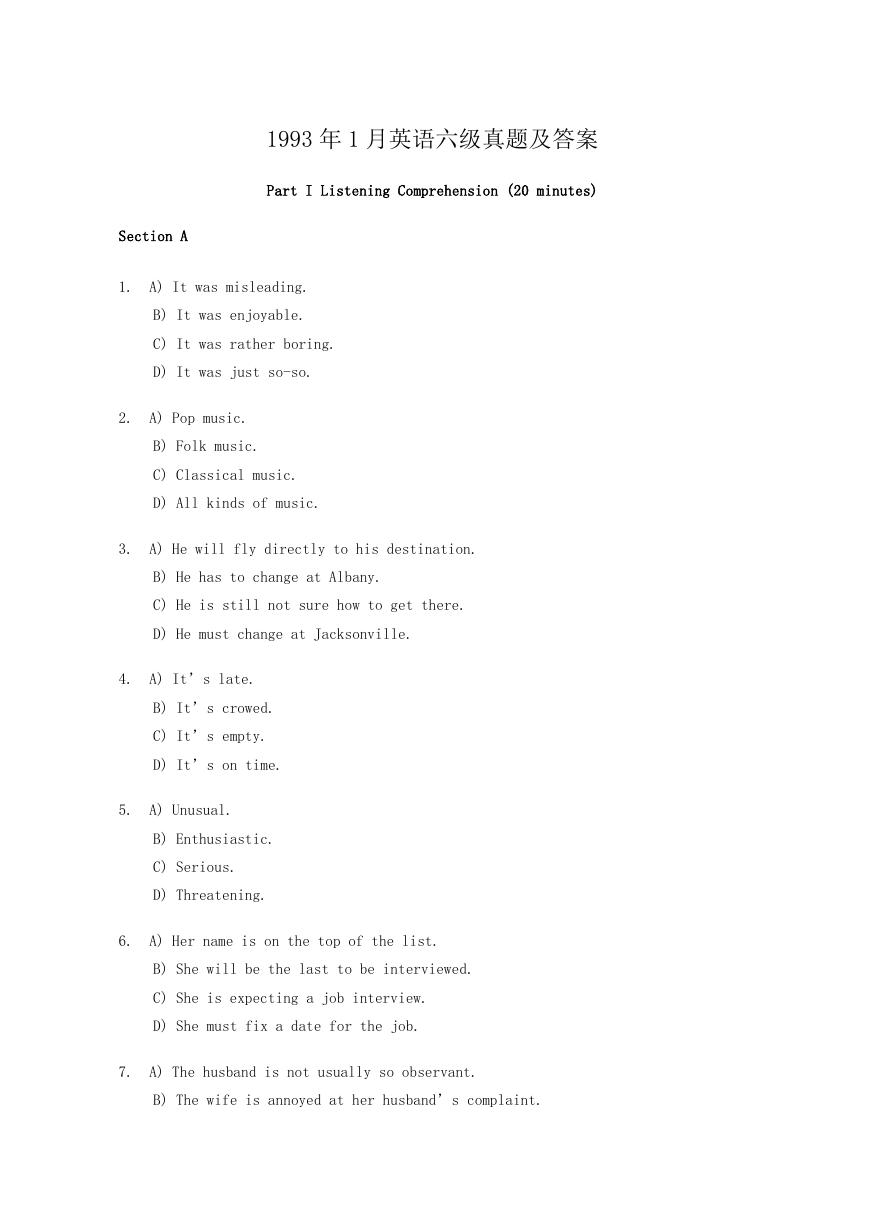
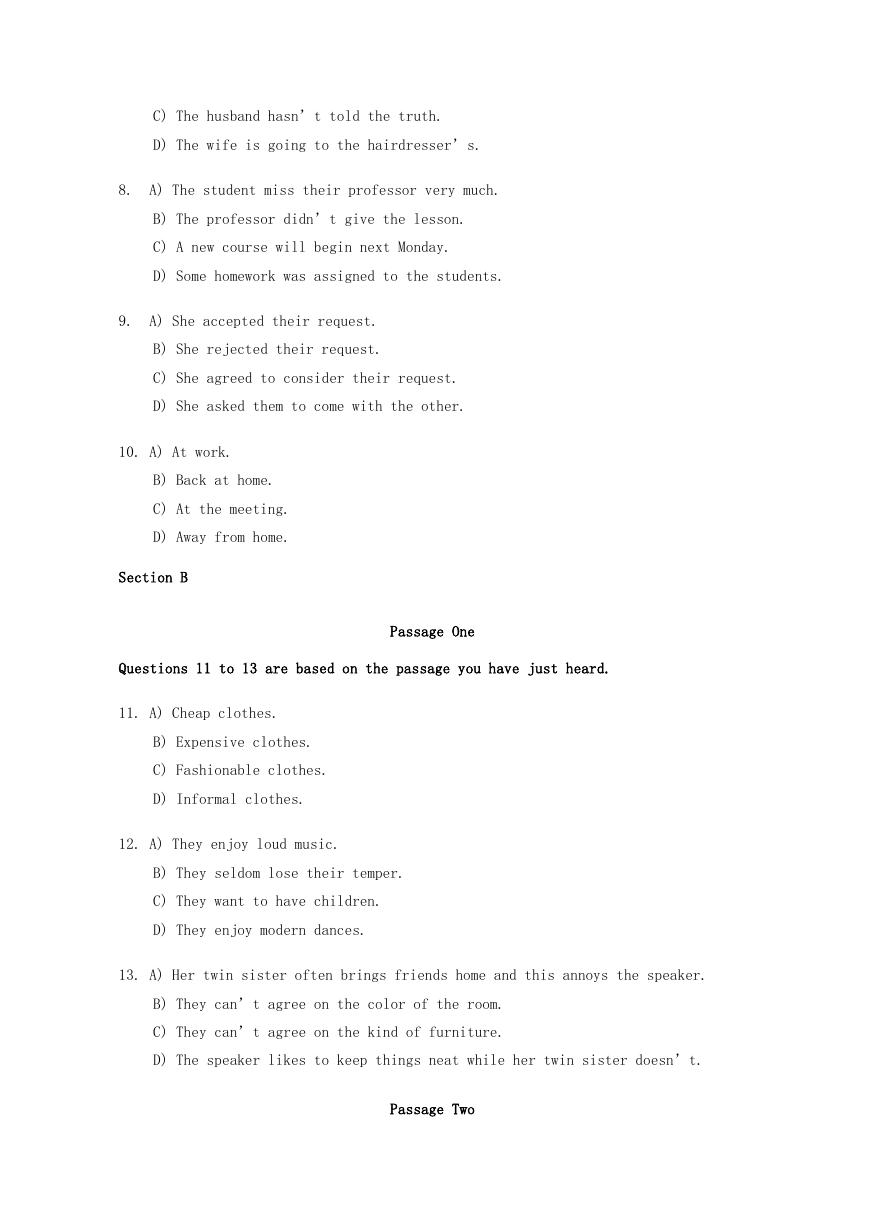

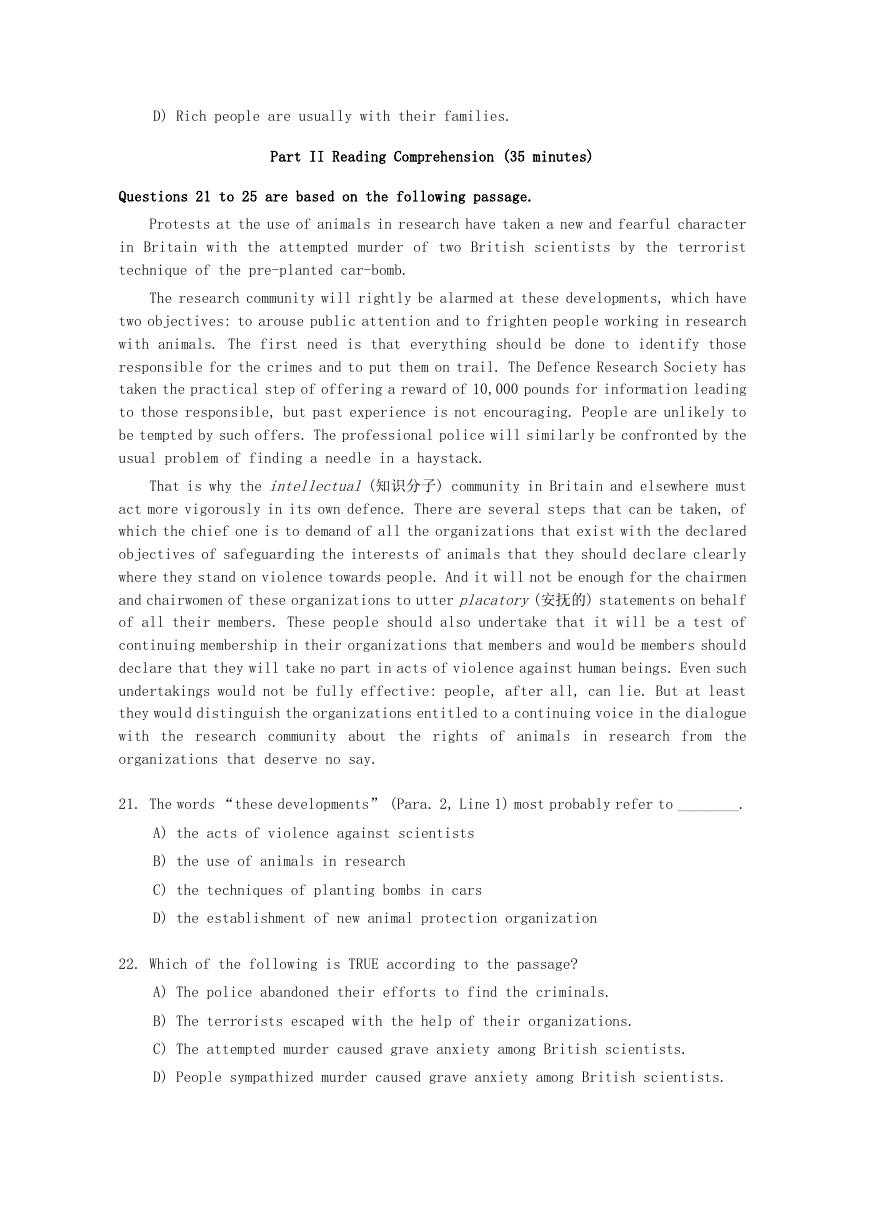
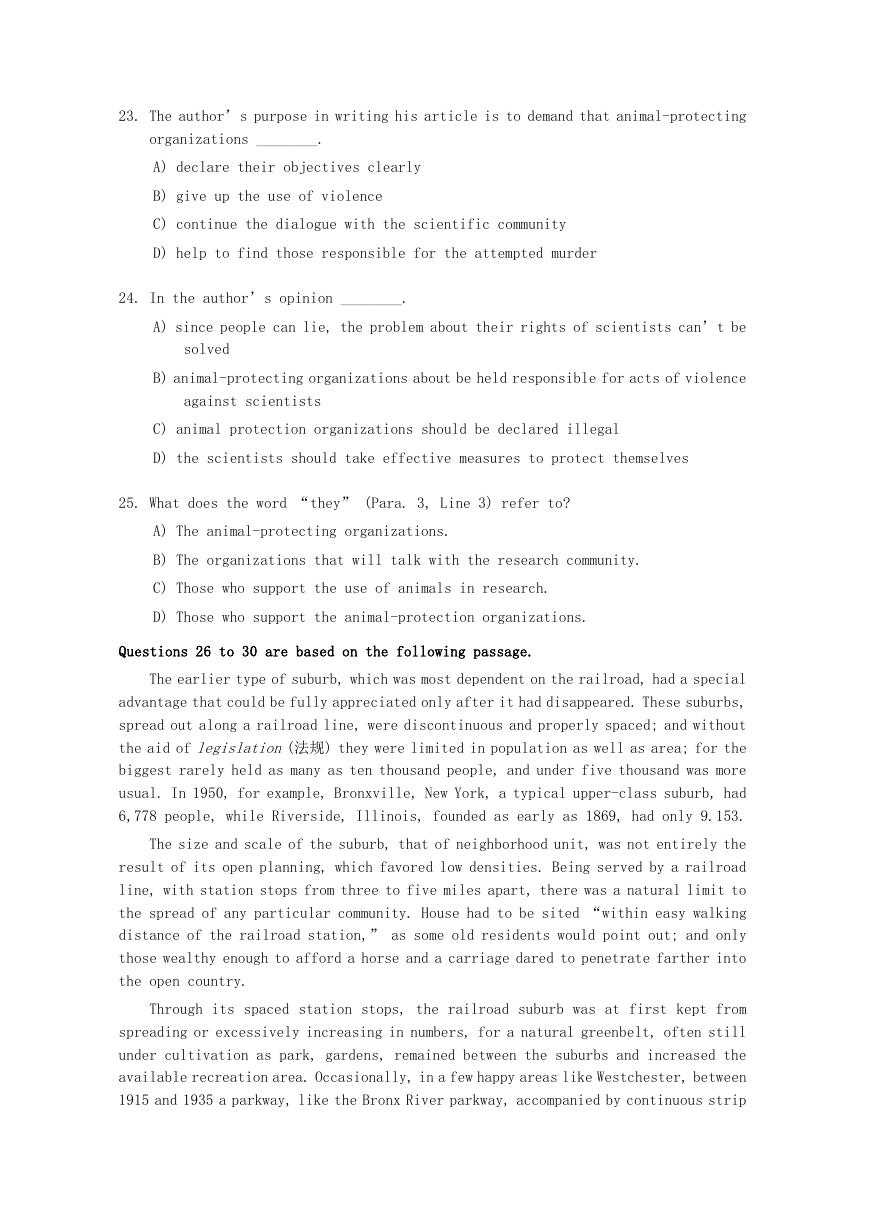

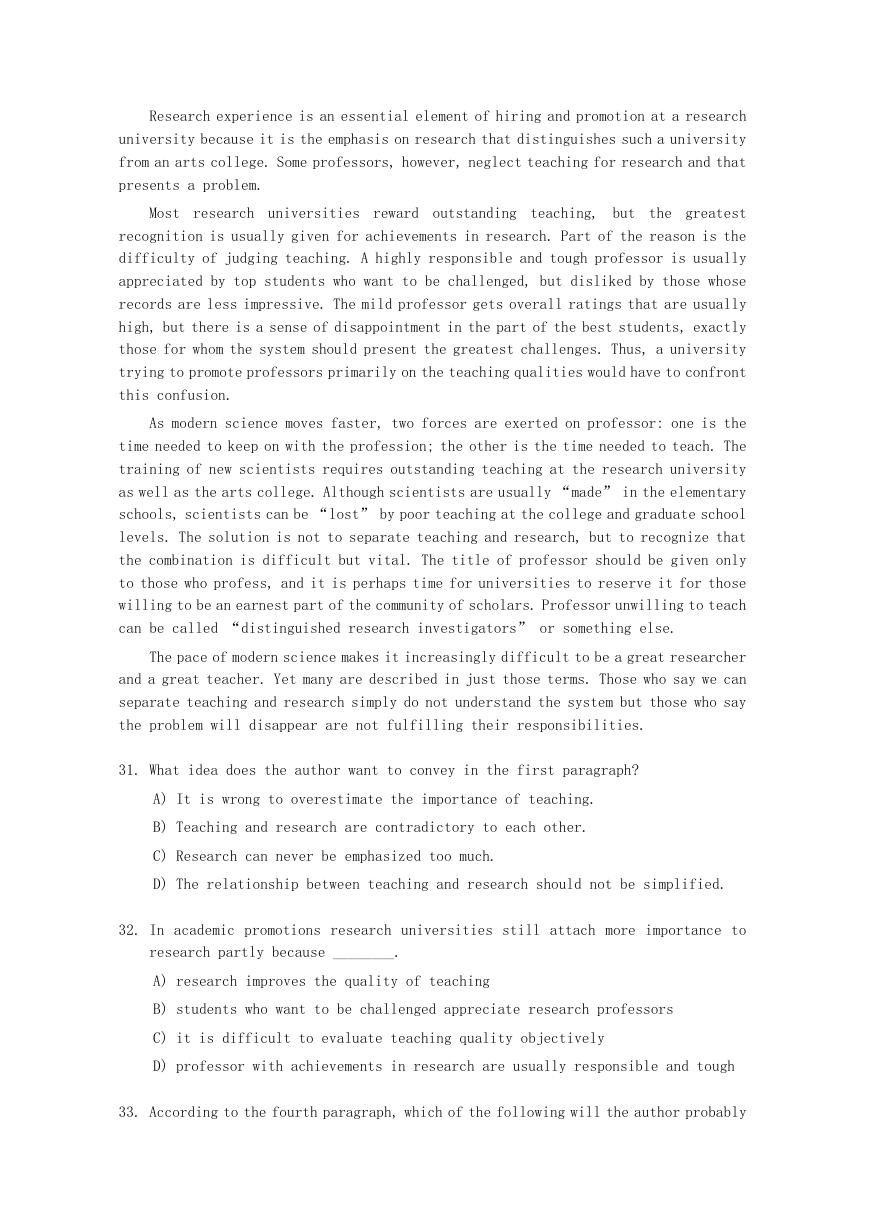
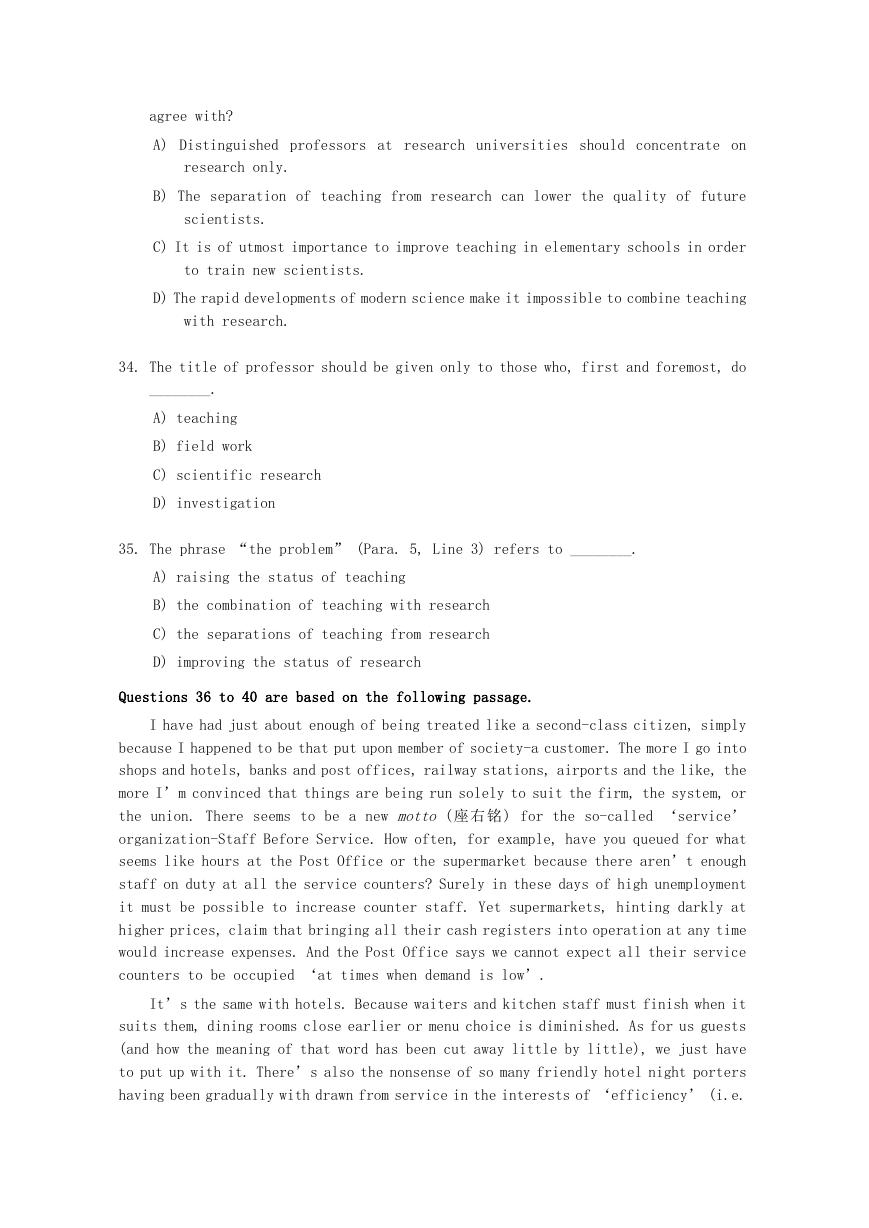








 2023年江西萍乡中考道德与法治真题及答案.doc
2023年江西萍乡中考道德与法治真题及答案.doc 2012年重庆南川中考生物真题及答案.doc
2012年重庆南川中考生物真题及答案.doc 2013年江西师范大学地理学综合及文艺理论基础考研真题.doc
2013年江西师范大学地理学综合及文艺理论基础考研真题.doc 2020年四川甘孜小升初语文真题及答案I卷.doc
2020年四川甘孜小升初语文真题及答案I卷.doc 2020年注册岩土工程师专业基础考试真题及答案.doc
2020年注册岩土工程师专业基础考试真题及答案.doc 2023-2024学年福建省厦门市九年级上学期数学月考试题及答案.doc
2023-2024学年福建省厦门市九年级上学期数学月考试题及答案.doc 2021-2022学年辽宁省沈阳市大东区九年级上学期语文期末试题及答案.doc
2021-2022学年辽宁省沈阳市大东区九年级上学期语文期末试题及答案.doc 2022-2023学年北京东城区初三第一学期物理期末试卷及答案.doc
2022-2023学年北京东城区初三第一学期物理期末试卷及答案.doc 2018上半年江西教师资格初中地理学科知识与教学能力真题及答案.doc
2018上半年江西教师资格初中地理学科知识与教学能力真题及答案.doc 2012年河北国家公务员申论考试真题及答案-省级.doc
2012年河北国家公务员申论考试真题及答案-省级.doc 2020-2021学年江苏省扬州市江都区邵樊片九年级上学期数学第一次质量检测试题及答案.doc
2020-2021学年江苏省扬州市江都区邵樊片九年级上学期数学第一次质量检测试题及答案.doc 2022下半年黑龙江教师资格证中学综合素质真题及答案.doc
2022下半年黑龙江教师资格证中学综合素质真题及答案.doc